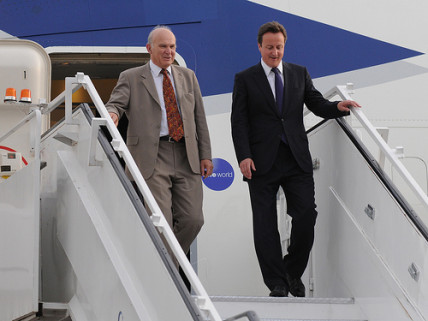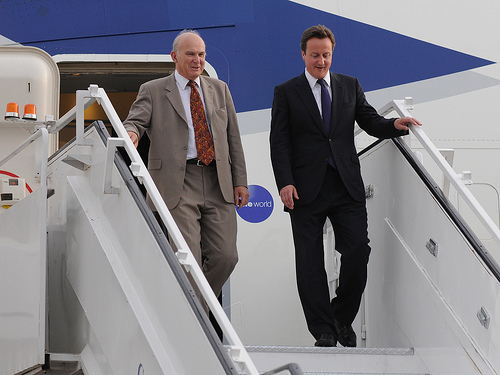
David Cameron and Vince Cable. Photograph courtesy of Number10
With little mention from the British media, Cameron is negotiating trade agreements that will open the UK jobs market to considerable inflows of Indian labour.
When David Cameron’s made a recent trip to India[1], with a huge business and media entourage, the main purpose of the trip remained hidden from the UK public despite the media presence.
The core purpose of the trip was to boost completion of the bilateral EU/India Free Trade Agreement by assuring India that its government’s sole demand in this agreement, for Indian companies to be able to supply cheap temporary labour into the EU but primarily into the UK, will be met. This is what UK media, including BBC staff, failed to report.
In statements he made while there, Cameron said there would be no limits on numbers of ‘students’, ‘workers’ – later changed to ‘graduates’ – and ‘businesspeople’ who would be welcome in the UK.
While the statement foregrounded ‘students’ coming to the UK and those who then stay and work in graduate jobs[2], the clue to the trade agreement being the purpose of the visit is the reference to ‘workers'[3].
Two pieces of information about the EU/India Free Trade Agreement are of enormous importance to the present and future resident UK workforce. The first is that, although this agreement has been negotiated for the last 5 years by the EU Trade Commission as an EU deal, it is, according to key Trade Commission staff, essentially a UK/India deal, in which the UK ‘can expect 85% of the gain and 85% of the pain’[4].
The second is that the single demand India is making in this deal is for any Indian company to be able to supply temporary skilled labour into the EU[5] – but, with reference to the first point, primarily into the UK[6].
In ‘tradespeak’, this part of ‘trade’ that is about bringing or sending workers across borders is called ‘Mode 4’. Mode 4 openings are effectively permanent commitments to open up and stay open to cross border labour supply.
Despite its generally secretive way of operating, Trade Commission negotiators have admitted throughout the negotiating period that there will be no EU/India Free Trade Agreement without Mode 4 concessions[7], underscoring the fact that Mode 4 concessions are the single demand from the Indian side.
Thus an effectively irreversible international trade agreement is resting on the UK opening its borders to an unlimited supply of temporary, cheap, skilled labour – just what David Cameron offered to India on this trip.
UK jobs are being traded primarily for the liberalised access to Indian financial services such as banking and insurance[8] that London-based transnational financial corporations are seeking. Cameron repeatedly emphasised the need for India to make these reciprocal liberalisations on his trip.
These concessions would be the ‘gains’ – 85 % to the UK, although actually to transnational financial services based in the City of London.
The ‘pain’ – 85% to the UK – will be the Mode 4 opening in response to Indian demands which must inevitably mean broad scale job displacements and the driving down of hard-won working conditions in the UK. Although financial service investment opportunities overseas may involve UK pension funds, they will not produce UK jobs.
Because trade agreement commitments are effectively permanent – to provide ‘investor security’ – these labour effects will be continuing, affecting future generations of UK resident workers too.
Apart from effects on individuals and the work force overall, broad scale temporary labour immigration can also have negative effects on the national economy, on economic recovery and the economic future.
As temporary migrant workers displace UK resident workers, the unemployment bill increases here while wages are repatriated overseas. Thus the earn/spend cycle needed for economic recovery is undermined. No tax or National Insurance is collected.
The skills base is eroded for the future so that ‘skills shortage’ becomes self-fulfilling, as is happening now in the vital and cross-cutting computing sector[9]. Individuals are deterred from investing in their own skills development when it means being in competition with unlimited cheap labour, not just from work being sent overseas but also through the importation of workers prepared to work for low wages.
Big business gains not only from the trade agreement trade-off, but also from the very profitable supply and use of cross-border labour, capitalising on the wage differential between lower and higher wage countries, and from the overall reduction in labour costs from the resulting downward pressure on wages in general.
Wages levels and other labour standards, as well as any balance between capital and labour, are achieved and maintained through the interrelated factors of limits to labour supply and the establishment of industrial agreements.
With EU Mode 4 trade concessions, Member States set their own limiting or delimiting regulatory framework. EU Mode 4 concessions for skilled worker entry potentially delimit labour supply and the UK government appears to be choosing to go all the way with this. At the same time, the pro-business European Court of Justice has established that only nationally-legislated industrial standards have legal standing[10] thus only the minimum wage counts. This puts UK skilled workers potentially in competition for the minimum wage with unlimited imported labour.
The Mode 4 categories that India is requesting in this trade deal are Contractual Service Suppliers (CSS), workers supplied by any Indian firm that is not transnationally established, and Independent Professionals (IPs) – thus the skilled workers or ‘graduates’ to which Cameron referred.
The UK has existing commitments for another Mode 4 category[11], Intra-corporate Transferees’ (ICTs). These are workers brought across borders by transnationally-established companies.
As an indication for future Mode 4 commitments, it is informative to consider how this existing commitment is being regulated by the UK government and utilised by transnational corporations. Although the UK’s actual ‘Intra-corporate Transferees’ commitment is only for senior managers and specialists, the government is allowing trans-national companies (TNCs) to bring in a much broader band of workers.
The Tier 2 ICT category of the UK Points Based System (PBS) has no numerical limits and is now the biggest labour migration category in the Points Based System[12].
Although the Coalition government has an ‘immigration cap’[13], the government has excluded temporary workers from the cap. This exemption is contradictory as effects on the resident workforce were a rationale for having a cap, and temporary workers, unable to organise, potentially have a significant negative effect.
The government is allowing ICTs who come for less than a year, which is the majority of them, to be paid just the minimum wage[14], made up to a low industry norm with tax-free expenses. The higher wage requirement which Vince Cable, Secretary of State for the department of business[15], tends to emphasise is for the smaller number of workers that come for more than a year.
‘Temporary’ is not defined in trade rules. According to the TUC, the government stipulates that this can now be 9-10 years[16] in the UK.
In fact the majority of the ‘ICTs’ brought in by transnational corporations are actually being supplied into other firms on a day rate. This allows transnational corporations to cream off profits from their ability to utilise the UK’s Mode 4 ICT (labour transfer) commitment while client firms are able to offload employer responsibilities. ‘Intra-corporate Transferees’ workers are reliant on the transnational company for their visa: UK workers are displaced or not hired.
The UK Points Based System was recently specifically prepared for Contractual Service Suppliers[17] within the ‘international agreements’ category in Tier 5, before the EU/India deal is finalised and shortly before David Cameron’s visit. Like the Tier 2 ICT category, this category has no numerical limit. Unlike the ICT category, which has a minimum salary requirement, albeit low, there is no salary floor for Contractual Service Suppliers. The other Tier 5 categories are sportspersons and religious workers and Tier 5 receives little attention.
There is now an intense barrage of propaganda and ‘news’ items promoting India in the UK, as well as on-going propaganda about the need for migrant workers. TheCityUK, the lobbying and propaganda organisation for the City of London Corporation and the transnational businesses that comprise the City, is well resourced to produce propaganda from the bequests made over centuries for the City to administer to the poor.
When David Cameron’s spin team changed ‘workers’ to ‘graduates’ during the India trip, it created ambiguity as to whether this meant those who come to study and then work in graduate jobs in the UK or those from Indian educational institutions who come as workers. The media posse, it seems, accepted the former meaning, but, as the Prime Minister was talking about entry, this clearly meant the entry of skilled workers who have graduated overseas[18].
The existing commitments for Intracorporate Transferees and Business Visitors combined with currently negotiated openings for Contractual Service Suppliers and Independent Professionals means that the UK will be open to skilled workers brought in under any employment circumstances, without numerical limits.
In response to enquiries, Number 10 and the Home Office will only make reference to existing trade commitments, current rules and Tier 2 ICT provision and not to the Free Trade Agreement trade-off covertly promised in the Prime Minister’s statements.
But we need to know the implications of commitments that are being made on our behalf before they become irreversible.
No 10 does now admit that Cameron discussed the Free Trade Agreement with the Indian Prime Minister during his trip, though it seems not to have been reported at the time.
Ultimately, Number 10 can hide behind the EU Trade Commission’s insistence that its trade negotiations are secret until they are completed. Yet as negotiators and business lobbyists[19] on both sides of the negotiating able know what is on offer, it is only the public – which will bear the brunt of the commitments – that is kept in the dark by this ‘confidentiality’.
David Cameron made a prior trade trip to India in 2010, directly after the election, with Vince Cable. They failed then to mention then the EU/India Free Trade Agreement, the central role of the UK in that agreement, the pivotal importance of India’s Mode 4 demands or what they will mean for people in the UK.
On this trip, while again keeping it all effectively secret from the UK public, David Cameron promised everything the Indian government has been demanding in the Free Trade Agreement. It all begs the questions of why top UK politicians so underhand with the people they supposedly work for, and on whose behalf are they working? The British public are being kept in the dark about trade agreements that could have significant impact on their livelihoods.
Written by Linda Kaucher
Linda is a researcher on international trade issues particularly surrounding the EU.
Notes:
- Dates of visit 18-20th February 2013
- In his speech at Unilever, the PM said that for Indian students coming to the UK to study ‘there’s no real limit on the length of time you can stay and work in the United Kingdom’ http://www.number10.gov.uk/news/david-camerons-speech-at-unilever-offices-in-mumbai/ while the Home office has indicated that those who come and graduate here and stay and work will only have to be paid in the 10th percentile of the industry norm wage http://www.homeoffice.gov.uk/publications/immigration/soi-cop-skilled-workers?view=Binary p5
- Joint statement on the India-United Kingdom summit 2013 at Hyderabad House, Delhi 19 February. http://ukinindia.fco.gov.uk/en/news/?view=PressR&id=858563882 Point 8 affirms the joint commitment to completion of the EU/India Free Trade Agreement. Point 48 ‘welcomes all legitimate …qualified workers’
- Personal interview with the EU Trade Commission’s Mode 4 specialist
- Email response from the EU Trade Commission’s senior trade lawyer
- An EU document leaked by the union organisation of another Member State showed the UK prepared to take the lion’s share of the EU’s commitment on the entry temporary migrant labour supplied by Indian firms. In fact the purpose of this document, shared by other Member State governments with their union organisations, was to reassure them that their commitments would be very small and thus secure their support for the agreement. The figures for the UK, even at a much higher level, cannot be taken as an upper limit. The UK government did not share the document.
- A chief EU Trade Commission negotiator Ignacio Garcia Bercero has stated this in several of the Trade Commission’s Civil Society Dialogue sessions
- Other ‘EU’ demands are for profit-sharing for ‘Big Pharma’[1][viii] in India’s generic medicines industry[1][viii], access for mixed retail giants such as Tesco and Carrefour[1][viii]and for subsidised EU dairy products into India. The EU also wants reduced tariffs on goods imported into India, especially cars. These corporate-demand liberalisations, including of financial services, have been protested in India because of the anticipated negative effects there
- http://www.cphc.ac.uk/docs/cphc-computinggraduates-june08.pdfhttp://www.computerweekly.com/blogs/inside-outsourcing/2013/01/restrict-it-offshoring-and-prevent-immanent-skills-shortage.html
- Notably the Viking, Laval and Ruffert cases
- These 1995 commitments from the Uruguay Round of trade talks from which the World Trade Organisation was set up, and the General Agreement on Trade in Services (GATS) initiated. Mode 4 is part of services and the EU made GATS Mode 4 ICT commitments at that time.
- http://m.guardian.co.uk/uk/2012/feb/28/companies-bypassing-immigration-cap
- The Migration advisory Committee previously recommended capping ICT numbers, but the UK government did not cap this category.
- Previously ICTs could be paid less than the Minimum Wage until the illegality of this was raised in parliamentary questions
- The Department of Business, Innovation and Skills (BIS)
- Owen Tudor, head of the TUC’s international Department in BBC radio 4 Today Program discussion November 2012
- Contractual Service Suppliers are within ‘international agreements’ in Tier 5 of the PBS. See the UK Border Agency’s November 2012 document showing changes to accommodate this Mode 4 CSS category in Tier 5 of the UK Points Based System (pp75-76, points 7.27-7.29) at this webpagehttp://www.ukba.homeoffice.gov.uk/sitecontent/documents/policyandlaw/statementsofchanges/ http://www.theyworkforyou.com/wms/?id=2012-11-22a.40WS.0
- Graduates or graduate equivalent’ is the trade stipulation that the EU makes for Mode 4 entry
- Non-Government Organisation Corporate European Observatory is currently pursuing legal action against the EU Trade Commission in regard to the access that business has been given to negotiating positions on the EU/India Free Trade Agreement which has been denied to civil society.




